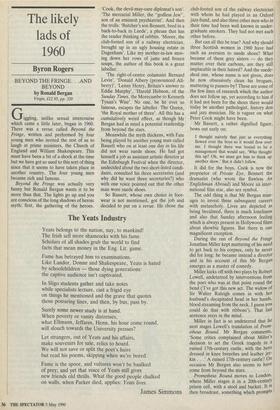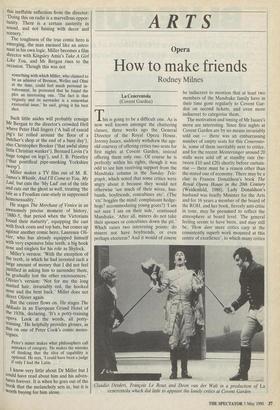The likely lads of 1960
Byron Rogers
BEYOND THE FRINGE. . .AND BEYOND by Ronald Bergan
Virgin, £12.95, pp. 320
Giggling, unlike sexual intercourse which came a little later, began in 1960. There was a revue called Beyond the Fringe, written and performed by four young men who invited the rest of us to laugh at prime ministers, the Church of England and William Shakespeare. This must have been a bit of a shock at the time but we have got so used to this sort of thing since that it seems to have taken place in another country. The four young men became rich and famous.
Beyond the Fringe was actually very funny but Ronald Bergan wants it to be more than that. The lights go up and you are conscious of the long shadows of heroic myth: first, the gathering of the heroes. `Cook, the devil-may-care diplomat's son'. `The mercurial Miller, the "godless Jew", son of an eminent psychiatrist'. And then the trolls: 'Butcher's son Bennett, bred in a back-to-back in Leeds', a phrase that has the reader thinking of rabbits. 'Moore, the club-footed son of a railway electrician, brought up in an ugly housing estate in Dagenham'. Like my mother-in-law mov- ing down her rows of jams and frozen soups, the author of this book is a great labeller.
'The right-of-centre columnist Bernard Levin', 'Donald Albery (pronounced All- berry)', 'Lenny Henry, Britain's answer to Eddie Murphy', 'Harold Hobson, of the Sunday Times, the Morecambe to Kenneth Tynan's Wise'. No one, be he ever so famous, escapes the labeller. The Queen, 'the Royal mother of three'. All this has a cumulatively weird effect, as though Mr Bergan had in mind a potential readership from beyond the stars.
Meanwhile the myth thickens, with Fate being played by another young man called Bassett who on at least one day in his life did not wear suede shoes. He had got himself a job as assistant artistic director at the Edinburgh Festival when the director, undecided about the two short-listed candi- dates, consulted his three secretaries (and why did he want three secretaries?) who with one voice pointed out that the other man wore suede shoes.
So Bassett, whose own choice in foot- wear is not mentioned, got the job and decided to put on a revue. He chose the club-footed son of the railway electrician with whom he had played in an Oxford jazz-band, and also three other men who in their time had been well known in under- graduate smokers. They had not met each other before.
But can all this be true? And why should three Scottish women in 1960 have had such an aversion to suede shoes? What became of these grey sisters — do they mutter over their carbons, are they still implacable in their hatred? And the suede- shod one, whose name is not given, does he now obsessively clean his brogues, muttering to passers-by? These are some of the few lines of research which the author does not follow up, yet according to him if it had not been for the shoes there would today be another pathologist, history don and jazz musician. He is vaguer on what Peter Cook might have been.
Mr Bassett, a rather dignified figure, bows out early on:
I thought naively that just as everything flowed over the boys so it would flow over me. I thought there was bound to be a management that would say, 'Who thought this up? Oh, we must get him to think up another show.' But it didn't follow.
It did for the boys. Cook is now the proprietor of Private Eye, Bennett the dramatist (who wrote the flawless An Englishman Abroad) and Moore an inter- national film star, also sex symbol.
The odd thing is that Mr Bergan man- ages to invest these subsequent careers with melancholy. Lives are depicted as being becalmed, there is much loneliness and also that Sunday afternoon feeling which is always present in Hollywood films about showbiz figures. But there is one magnificent exception.
During the run of Beyond the Fringe Jonathan Miller kept muttering of his need to get back to his corpses, only he never did for long: he became instead a director and in his account of this Mr Bergan emerges as a master of comedy. Miller kicks off with two plays by Robert Lowell, undeterred by interventions from the poet who was at that point round the bend ('I've got this new act. The widow of Sir Walter Raleigh comes in with her husband's decapitated head in her hands, blood streaming from the neck. I guess you could do that with ribbons'). That last sentence stays in the mind. Miller in fact is so undeterred that he next stages Lowell's translation of Prom- etheus Bound. Mr Bergan comments, 'Some critics complained about Miller's decision to set the Greek tragedy in a ruined 17th-century castle, with the hero dressed in knee breeches and leather jer- kin . . .' A ruined 17th-century castle? On occasion Mr Bergan also seems to have come from beyond the stars. Prometheus Bound moves to London, where Miller stages it in a 20th-century prison cell, with a stool and bucket. It Is then broadcast, something which prompts this ineffable reflection from the director: `Doing this on radio is a marvellous oppor- tunity. There is a certain austerity in sound, and not fussing with decor and scenery.'
The toughness of the true comic hero is emerging, the man encased like an astro- naut in his own logic. Miller becomes a film director with Kingsley Amis's Take A Girl Like You, and Mr Bergan rises to the occasion. Though this was not
something with which Miller, who claimed to be an admirer of Bresson, Welles and Olmi at the time, could feel much personal in- volvement, he protested that he found the plot an interesting one. 'The fact is that virginity and its surrender is a somewhat existential issue,' he said, giving it his best shot.
Such little asides will probably consign Mr Bergan to the director's crowded Hell where Peter Hall lingers ('A ball of rancid Pig's fat rolled around the floor of a butcher's shop at the end of a busy day'), also Christopher Booker (`that awful slimy little Christian wanker'), Bernard Levin ('a huge tongue on legs'), and J. B. Priestley (that pontifical pipe-smoking Yorkshire twerp').
Miller makes a TV film out of M. R. James's Whistle, And I'll Come to You, My Lad, but cuts the 'My Lad' out of the title and cuts out the ghost as well, treating 'the tale as a Freudian case-study in suppressed homosexuality.'
He stages The Merchant of Venice in an awesomely precise moment of history, 1880-5, that period when the Victorians found their maturity', equipping the cast with frock coats and top hats, but comes up against another comic hero, Laurence Oli- vier, who has already equipped himself with very expensive false teeth, a big hook nose and ringlets for his role as Shylock. Miller's version: 'With the exception of the teeth, in which he had invested such a !air amount of money that I did not feel Justified in asking him to surrender them, he gradually lost the other excrescences.' Olivier's version: 'Not for me the long matted hair, invariably red, the hooked nose and the bent back.' Miller does not direct Olivier again. But the career flows on. He stages The Mikado in an European Grand Hotel of the 1920s, declaring, 'It's a potty-training opera. Look at the words, all potty- training.' He helpfully provides glosses, as this on one of Peter Cook's comic mono- logues.
Peter's miner makes what philosophers call mistakes of category. He makes the mistake of thinking that the idea of capability is optional. He says, 'I could have been a judge if only I had the Latin. . .
I know very little about Dr Miller but I Could have read about him and his adven- tures forever. It is when he goes out of the book that the melancholy sets in, but it is Worth buying for him alone.



















































 Previous page
Previous page